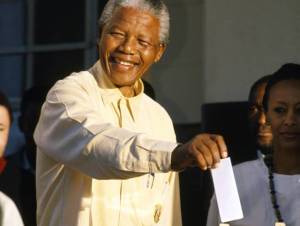In each issue of Perspectives we look at the lives of inspirational real-life characters and how they helped change their particular corner of the world or industry. In this issue we’re focusing on someone who, arguably, changed the world.
 As with all great leaders Nelson Mandela had his supporters and his detractors. But it is probably safe to say that he had far more supporters around the world, than detractors, and that he will go down in history as a legendary leader and hero. How did he engender such loyalty?
As with all great leaders Nelson Mandela had his supporters and his detractors. But it is probably safe to say that he had far more supporters around the world, than detractors, and that he will go down in history as a legendary leader and hero. How did he engender such loyalty?
Nelson Rolihlahla (“Troublemaker”) Mandela was born in 1918 to the Thembu royal family in South Africa. He studied law at Fort Hare University and the University of Witwatersrand and then became an anti-apartheid revolutionary – standing against racial segregation and Afrikaner minority rule. Perhaps what won Mandela a loyal following at this stage was his willingness to walk the talk – not just talk the talk.
Working as a lawyer against a government that promoted segregation, he was repeatedly arrested and was then prosecuted in the Treason Trial from 1956 to 1961. But in this instance the prosecution was unsuccessful. Rather than break Mandela’s spirit, the experience left him more determined than ever to fight for his cause using non-violence – as influenced by Mahatma Gandhi.
Then, after participating unsuccessfully in a protest to save the all-black Sophiatown (a suburb in Johannesburg) from being demolished he had a change of heart. At that time Mandela believed he had no other alternative. He abandoned his belief in a non-violent struggle and instead co-founded a militant unit in 1961, to carry out sabotage against the apartheid government. At his insistence the sabotage was carried out on public buildings at night, when they were empty, to avoid loss of life. The following year, he was arrested, found guilty of conspiring to overthrow the state, and sentenced to life in prison.
The three hour speech he gave at his trial – about how history would absolve him – is considered one of his most influential speeches. Again, proving that he could walk the talk, Mandela refused to be idle in prison. Despite suffering verbal and physical abuse from the guards he organised the political prisoners, instigated work and hunger strikes to improve conditions in prison and initiated the ‘University of Robben Island’ encouraging prisoners to share their areas of expertise with the prison community. He learnt Afrikaans to better communicate with the wardens and widened his network outside the prison community – receiving visits from prominent politicians. And 27 years later, thanks mostly to his robust political agenda, inspiring thought leadership and international pressure from his wide-ranging network which included leaders in Cuba, Egypt, Russia, USA, and the UK, Mandela was released amidst escalating public strife in South Africa.
After a world tour in which he met with many heads of State who had admired and supported him throughout his prison term Mandela returned to South Africa and reformulated his political agenda. No longer was he the rebel – but rather the statesman, because that was what South Africa needed most. This ability to adapt to fulfil the need of the hour won him even more supporters both within and without South Africa.
Mandela built a multiracial task force that was far more moderate than the military outfit he led before his arrest. He pleaded with his people to step back from the abyss of civil war. Mandela and the new president of South Africa, F W de Klerk, were jointly awarded the Nobel Peace Prize in 1993. Mandela then began lobbying for big businesses to invest in South Africa to secure economic security for the country.
In 1994, Mandela’s political party won the election and at the age of 76, he became South Africa’s first black chief executive. In the same year he published his autobiography, ‘Long Walk to Freedom.’ During his tenure Mandela worked hard to mend relationships between blacks and whites. When South Africa hosted the 1995 Rugby World Cup, Mandela used the event to win the hearts of white rugby fans and coax blacks to get behind the national rugby team. He also supervised the formation of the Truth and Reconciliation Commission to look into crimes committed under apartheid – by both whites and blacks. He worked hard to ensure that the disadvantaged blacks had better access to clean water, electricity, healthcare, schooling and other necessities that white communities enjoyed.
After retiring from the presidency at the end of his first term – at the age of 81 – Mandela continued to be a strong voice for justice in the international community. He died in December 2013 at the age of 95.
His legacy is such that the world was willing to overlook his shortcomings and focus on his successes – which were many and inspirational. His loyal supporters remember him for his bravery in the face of opposition, his ability to adapt, his unwavering focus on justice for all his constituents and his tireless efforts for peace and reconciliation.
His legacy is such that the world was willing to overlook his shortcomings and focus on his successes – which were many and inspirational. His loyal supporters remember him for his bravery in the face of opposition, his ability to adapt, his unwavering focus on justice for all his constituents and his tireless efforts for peace and reconciliation.
Image from http://www.nelsonmandela.org